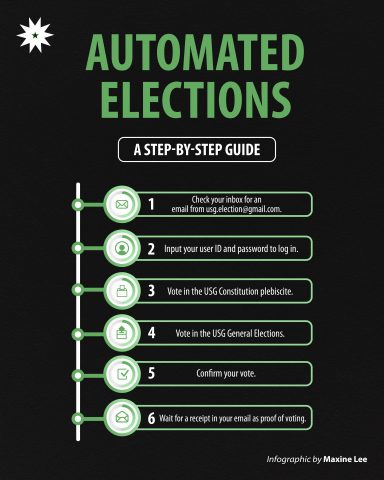
Following the postponement of the General Elections in the previous Academic Year (AY), the DLSU Commission of Elections (Comelec) moved elections online. Years in the making, an automated voting platform, which was created in coordination with development teams from the La Salle Computer Society (LSCS) and the User Experience Society (UX Society), will finally be used in hopes of giving students a secure and user-friendly voting experience for the first automated election in University Student Government history.
Charting new waters
The idea of having automated elections is not a novel one. Comelec Chairperson John Christian Ababan explains that plans were already drafted back in 2018, but the project was left on the table because of the “academic commitments” of those primarily involved in its making.
However, renewed interest in automated elections sprung in the past AY, as the pandemic necessitated a shift to online modalities for student activities. The original automated system had to be tailored to the new setting.
“So nag-start ‘yung testing ng June 2020, tapos we continued from there, ‘yung improvements, ‘yung additional features…we’ve asked LSCS to include that kasi it’s needed,” Ababan recalls.
LSCS Vice President for Research and Development Gerald Dalan explains that rather than completely rebuilding a site from scratch, his development team instead improved upon the foundations set by a team from the UX Society, spending the last few months adding new features to the website.
Securing processes
Ababan divulges that emails that contain a voter’s login details will be sent to enrolled students on the first day of the election period. Once on the site, students will have to vote on the plebiscite and for USG positions, for which the candidates’ platforms will be shown. An email receipt will be sent to confirm the student’s vote afterwards.
At the end of each voting day, the platform will be paused to prevent votes from being cast outside official voting hours. The turnout will be mandatorily checked every night and again the next morning to confirm the counts are not tampered. Students are blocked from logging in after they have voted.
To ensure that only enrolled students can vote in the elections, Comelec has acquired an official list of enrolled students from the Office of the University Registrar.
Additional security features to prevent tampering were also added to the website during development. This includes adding an auditing feature that tracks any setting changes made by the developers or Comelec officers.
Although the website was built by students, Ababan reassures the voters that the members of the development teams of LSCS and UX Society have never been affiliated with either political party at any point during their stay in the University.
A rough road ahead
During every election, there is a possibility of a low voter turnout, a concern that has only grown further in the online setting. “Of course, we think that it’s going to be a challenge. Kahit naman sa physical, it’s also a challenge,” Ababan admits.
(Even with a physical setting, it’s also a challenge.)
Nonetheless, they have made preparations for this outcome. The Online Election Code has provisions that allow Comelec to declare at most a three-day extension to the voting period if turnout is too low to validate an election.
Comelec and their partner organizations have also explored the possibility of voters experiencing connectivity problems during the given period. Several bandwidth consumption tests were run, and “voting through the platform takes no more than 10 megabytes of data,” Ababan notes.
Furthermore, he mentions that they are expecting an estimated 10,000 students to vote in Make-up Elections 2021. In the event that the website crashes during the voting period, adjustments shall be made to the schedule. He specifies, “Let’s say, Monday nag-crash…we [would] have to bring down the website muna for a while until the problems [are fixed].”
Dalan clarifies that the website will be hosted by the University’s Information and Technology Services
